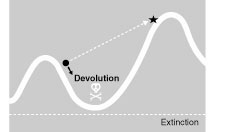LET GO AT THE TOP
Don’t mistake a clear view for a short distance.
The terror of devolution is that a firm must remain intact while it descends into the harsh deserts between the mountains of successes. It must continue to be more or less profitable while it devolves. You can’t jump from peak to peak. No matter how smart or how speedy an organization is, it can’t get to where it wants to go unless it muddles across an undesirable place one step at a time. Enduring a period of less than optimal fitness is doubly difficult when a very clear image of the new perfection is in plain sight.
For instance, sometime in the early 1990s the Encyclopaedia Britannica company saw that they were stuck on a local peak. They were at the top: the best encyclopedia in print. They had a worldwide sales force peddling a world-recognized brand. But rising fast nearby was something new: CD-ROM. The outline of this dazzling new mountain was clear. Its height was inspiring. But it was a different realm from their old mountain: no paper, no door-to-door salespeople, cheap, little dinky disks on the shelf, and a media that required constant updates. They would have to undo much of what they knew. Still there, clear as could be, was their future. But while the destination was extremely clear, the path that led to it was treacherous. And, it turned out, the route was even longer than they thought. The company spent millions, lost salespeople in droves, and verged on collapse. They entered a scary period during which neither print nor CD worked. Eventually they completed the CD-ROM encyclopedia they had envisioned many years earlier, but only after an outsider (Microsoft) published a better one. Encyclopaedia Britannica’s future is still in doubt. But their travails are common. Says futurist Paul Saffo: “We tend to mistake a clear view of the future for a short distance.”

To scale a higher peak — a potentially greate gain — often means crossing a valley of less fitness first. A clear view of the future should not be mistaken for a short distance.
Today, nearly everyone in business has a clear view of the future of TV. It’s something that comes to you in the same way you get the internet. You choose your shows, from 500 channels. You can shop, maybe interact with a game, or click for more information about a movie you are watching. The technology seems feasible, the physics logical, and the economics plausible. But Future TV looks a lot closer than it really is because the path between here and there winds through a barren desert with little optimal about it. Although the economics may work later, they barely work out now in the alkali flats. It may be that none of the large television or computer or phone companies are sufficiently nimble (or hungry) to make it across the valley of death–even though the shape of success is so visible.

